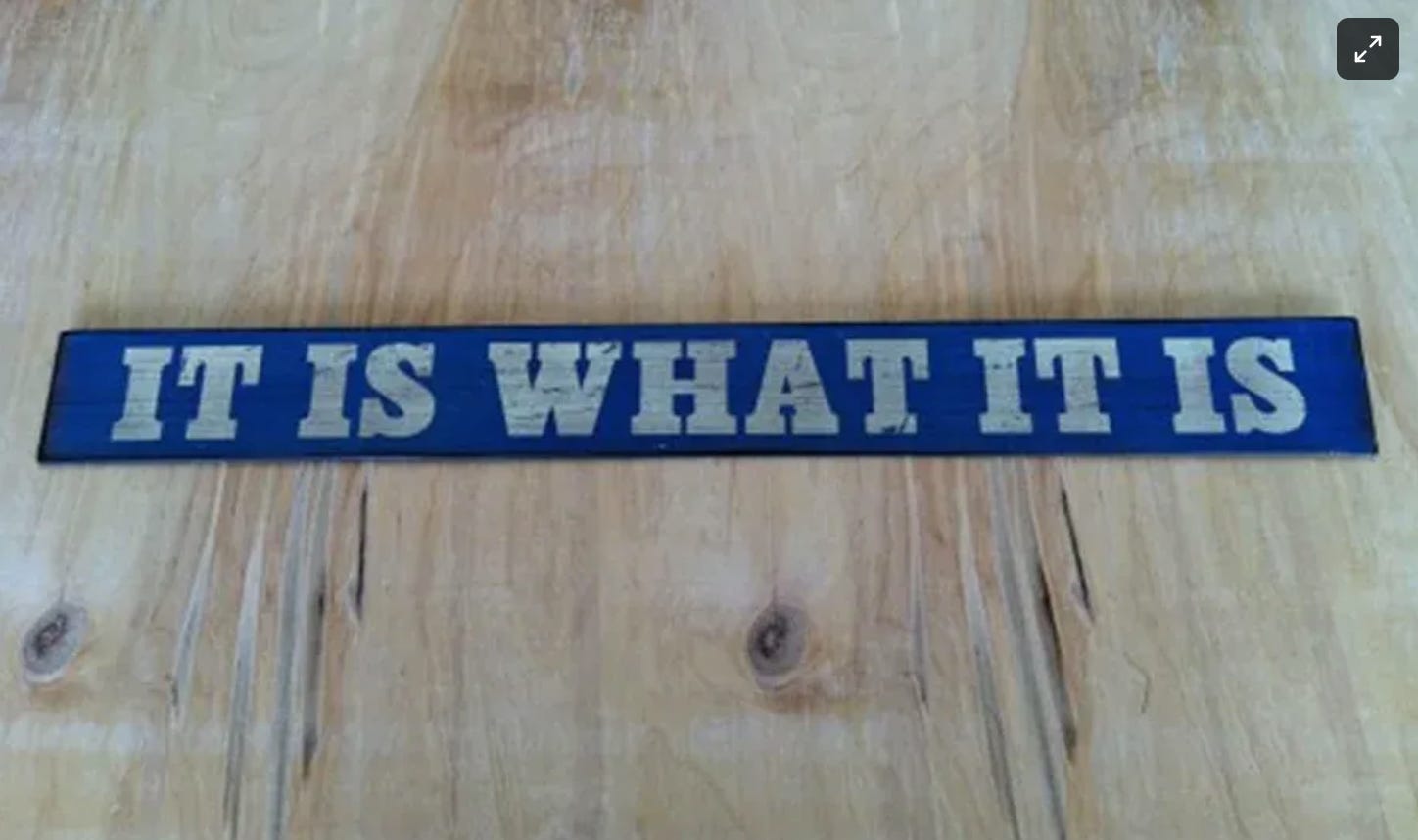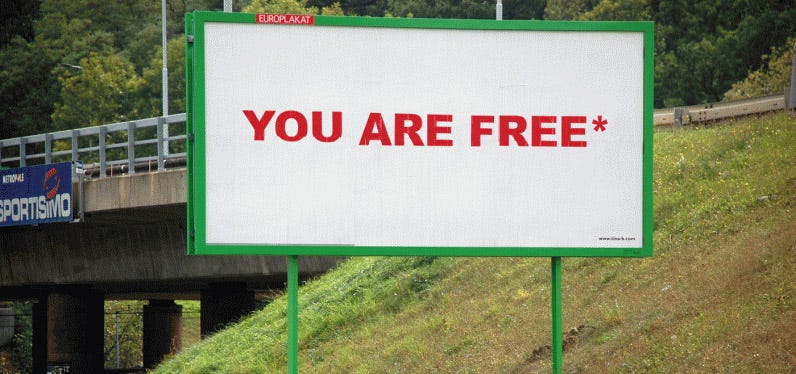🍄 What is Free Will? Our Greatest Power Struggle.
The Free Will vs Determinism debate is usually framed as an esoteric discourse. But the way we talk about freedom has a direct effect on everything from our personal lives to national politics.
Exploring every rabbit hole there is for the past 30 years. For more wanderings, become an Alice in Futureland subscriber—it's free.
🍄 AudioDose: this is Alice on Sonic Mushrooms. Free will here.
🎧 Alice in Futureland podcasts
📘 Alice in Futureland books
Hello, we’re Alice, and we are always in a state of wander. Today, we’re thinking about the theory of free will. At least we think we are. Do we have free will? – It’s a question increasingly up for debate by philosophers and scientists as neuroscience burrows further into consciousness and the quantum mind. Albert Einstein said in a 1929 interview that because he didn’t believe in free will, “…I claim credit for nothing. Everything is determined, the beginning as well as the end, by forces over which we have no control. It is determined for the insect as well as for the star. Human beings, vegetables or cosmic dust, we all dance to a mysterious tune.” The 19th-century materialist, T.H. Huxley, more bluntly, described human beings as “conscious automata” with no free will. Is our sense of self all just an illusion?
Control Issues
Nearly a century later and still the mystery lingers. As scientists attempt to crack the conundrum of free will, many have made up their mind, (although exactly how, they still don’t know.) “Your particles are just obeying their quantum-mechanical marching orders,” theoretical physicist and founder of the World Science Festival, Brian Greene told TIME magazine. “You have no ability to intercede in that quantum-mechanical unfolding. None whatsoever … my feeling is that the reductionist, materialist, physicalist approach to the world is the right one. There isn’t anything else; these grand mysteries will evaporate over time.” But, not all doom and gloom. Destiny’s wild. “Rather than feeling, ‘Damn, there’s no universal morality,’ ‘Damn, there’s no universal consciousness,'” he says, “how wondrous is it that I am able to have this conscious experience and it’s nothing more than stuff? That stuff can produce Beethoven’s Ninth Symphony, that stuff can produce the Mona Lisa, that stuff can produce Romeo and Juliet? Holy smokes, that’s wondrous.”
The half-second rule
One of the freshest theories on free will came from Boston University’s Chobanian & Avedisian School of Medicine, late last year. It presents consciousness as a memory system and says that choices are formed unconsciously and become conscious around half a second later. “In a nutshell, our theory is that consciousness developed as a memory system that is used by our unconscious brain to help us flexibly and creatively imagine the future and plan accordingly,” writes Andrew Budson, MD, professor of neurology, in the Cognitive and Behavioral Neurology journal. “What is completely new about this theory is that it suggests we don’t perceive the world, make decisions, or perform actions directly. Instead, we do all these things unconsciously and then—about half a second later—consciously remember doing them.”
Budson developed this new theory alongside psychologist Elizabeth Kensinger, Ph.D., from Boston College, and philosopher Kenneth Richman, Ph.D., at the Massachusetts College of Pharmacy and Health Sciences. “We knew that conscious processes were simply too slow to be actively involved in music, sports, and other activities where split-second reflexes are required. But if consciousness is not involved in such processes, then a better explanation of what consciousness does was needed,” says Budson. The team anticipates further exploration could allow patients to improve problem behaviors such as overeating and help us understand the ways in which brain structures support memory, and even provide insight into philosophical issues around free will and moral responsibility. “Even our thoughts are not generally under our conscious control,” says Budson. “This lack of control is why we may have difficulty stopping a stream of thoughts running through our head as we’re trying to go to sleep, and also why mindfulness is hard.”
Who Pulls The Strings?
God does not play dice with the universe. —Albert Einstein.
Philosopher, neuroscientist and New York Times best-selling author, Sam Harris, compares free will to an illusion, so convincing that people refuse to believe that we don’t have it. “The illusiveness of free will is as certain a fact as the truth of evolution, in my mind,” says the author of Free Will [2012]. “And unlike evolution, understanding this truth about the human mind has the potential to change our mind about moral goodness and what it would mean to create a just society.” He goes on to say that, “the problem is not merely that the problem of free will makes no sense objectively, it makes no sense subjectively, either. The popular conception of free will seems to rest on two assumptions: (1) that each of us could have behaved differently than we did in the past, and (2) that we are the conscious source of most of our thoughts and actions in the present.” Harris declares both assumptions false.
Soul Play
Sam Harris also brings soul to his thoughts on free will as an illusion. “Even if we have souls, even if the human mind were made out of soul-stuff, that we don’t understand, nothing about my argument would change,” he says. “The unconscious operations of a soul grants you no more freedom that the unconscious neurophysiology of your brain does. If you don’t know what your soul is going to do next, you’re not in control of your soul. Whether determinism matters for free will has been the topic of endless debate.
And now for the flip side…
"Free will is the idea that we make choices and have thoughts independent of anything remotely resembling a physical process. Free will is the close cousin to the idea of the soul – the concept that ‘you’, your thoughts and feelings, derive from an entity that is separate and distinct from the physical mechanisms that make up your body. From this perspective, your choices are not caused by physical events, but instead emerge wholly formed from somewhere indescribable and outside the purview of physical descriptions. This implies that free will cannot have evolved by natural selection, as that would place it directly in a stream of causally connected events.”
—Alfred Mele, distinguished professor at Florida State University, Department of Philosophy
In Effective Intentions, Alfred Mele shows that the evidence offered to support the claims that there is no free will is sorely deficient. He also shows that there is strong empirical support for the thesis that some conscious decisions and intentions have a genuine place in causal explanations of corresponding actions. In short, there is weighty evidence of the existence of effective conscious intentions or the power of conscious will.
The Free Will Debate Has Real-world Consequences
Why is there all this interest in free will—not just among philosophers, scientists, and theologians—but among people in general? Some people value free will so deeply that they are terribly upset by news reports that neuroscientists have proved that free will is an illusion. Whether free will exists or not, belief in free will is very real. Part of the answer may be that some of the disputants mean very different things by free will.
In an article in The Institute of Art and Ideas, essayist Lewis Waller states free will is political. The way we talk about freedom has a direct effect on everything from our personal lives to national politics. "Accepting that we are determined beings doesn’t destroy our idea of freedom, it enlarges it. Broadening our idea of freedom leads to a politics that focuses on where our choices are constrained; whether that’s through fuel poverty, poor wages, decaying infrastructure, or underfunded healthcare. Free will is about allowing people the choice to make choices. This is a liberal framework that’s not reducible to the government ‘getting out of people’s way’, but instead acknowledges that if freedom is about a broader range of choices, then intervention is preferable than inaction when its goal is to expand those choices. If we are all determined, we can at least make sure we are determined by good health, education, and a basic level of welfare, rather than constrained by poverty, fatigue, and isolation."
To quote Physicist Freeman Dyson, “Freedom is the divine spark that causes human children to rebel against grand unified theories imposed by their parents.”
"Moral responsibility is not a physical principle but a construct of human psychology and society. It expresses the view that we must strive to choose some behaviors and reject others. Some find that harder than others. Some can be encouraged to do so, perhaps by social sanctions. This is what we see in the world. To say that it only looks that way is to add nothing significant.”—Philip Ball, science writer
In “Why free will is beyond physics,” Philip Ball argues that “free will” is not ruled out by physics—because it doesn’t stem from physics in the first place. To claim that reality is not what you think it is, but that this can never be proven, is to speak metaphysically. Immanuel Kant was doing so when he postulated the Ding-an-sich —the “thing in itself”—that we can never access through our senses. It can be fun and stimulating to debate such things, but it is not science.
🦋 ALICE believes that being a morally responsible person, is worth bringing everyone to the table—moral responsibility does not depend on anything super-natural, although we are very open to hearing from all points of view. Any discussion that doesn’t capture the different but related strands of thinking on free will, we believe is not illusionary, but delusionary.
What do you think? Ready to add to the debate? ALICE would like to know your answer to a simple, complex question:
What is free will?
What Else We Are Wondering…
📘 Robert Sapolsky, one of the great behavioral scientists, the bestselling author of Behave, plumbs the depths of the science and philosophy of decision-making to mount a devastating case against free will, an argument with profound consequences. In Determined, Sapolsky takes his argument all the way, mounting a brilliant (and in his inimitable way, delightful) full-frontal assault on the pleasant fantasy that there is some separate self telling our biology what to do. Sapolsky applies the new understanding of life beyond free will to some of our most essential questions around punishment, morality, and living well together. By the end, Sapolsky argues that while living our daily lives recognizing that we have no free will is going to be monumentally difficult, doing so is not going to result in anarchy, pointlessness, and existential malaise. Instead, it will make for a much more humane world.
🧠 Can you measure free will? The answer is maybe—maybe. What does this mean for free will? Well, on the one hand, we have Libet (the most famous study developed by neuroscientist Benjamin Libet in the 1980s to test if the brain’s “readiness potential” could be used to determine whether humans have free will) concluding that free will is impossible because our brain keeps the build-up to action away from our conscious minds—the decision is untouchable. On the other hand, that notion appears to be debunked by the fact that our brains might not be trying to hide anything from us after all—they’re just noisy. To make it all even more confusing, there is even another annoying philosophical question to address: Does it even make sense to talk about free will if someone is prompted to prepare for specific actions in an experimental setting? Can we ever make a framework to study consciousness when consciousness itself is defined by a lack of framework? So the question remains; can you measure free will? Who knows, but we should certainly keep trying to come up with ways to try. What do you think? Do you feel in control?
Source: iMotions
🧠 A Fresh Look at Free Will: Challenging the Libet Paradigm. A recent study challenges the long-standing Libet paradigm about free will. The team discovered that the EEG activity, dubbed readiness potential, registered before decision-making in Libet’s original experiment has no direct correlation to the actual decision. Moreover, the study revealed that the moment of conscious intention can be influenced by experimental procedures. This ground-breaking research suggests that the Libet paradigm may not be the definitive answer to the complex question of human free will.
👁🗨 Free Will? A Documentary
No idea is more fundamental to who we are than the idea that we are free to choose what we do and who we will become. This idea is known as free will and since ancient times humanity has debated whether or not we have it. The question still remains: are we truly free? And in what sense are we free? Are we determined by forced beyond our control? Is free will compatible with determinism? What does quantum mechanics and neuroscience say? Is free will necessary in order for society to function? What implications does free will have on morality, religion, and the criminal justice system?
Life is like a game of cards. The hand you are dealt is determinism; the way you play it is free will.
—Jawaharlal Nehru (1889 - 1964), first prime minister of independent India, anti-colonial nationalist, secular humanist, social democrat, and author.
Craving more?
📘 Alice in Futureland books
🎧 Alice in Futureland podcasts
Thanks for tuning in.
For more wanderings, become an Alice in Futureland subscriber—it's free.
Invite your friends to this mad tea party and let's see how many things we can learn before breakfast.
©2023 Alice in Futureland









